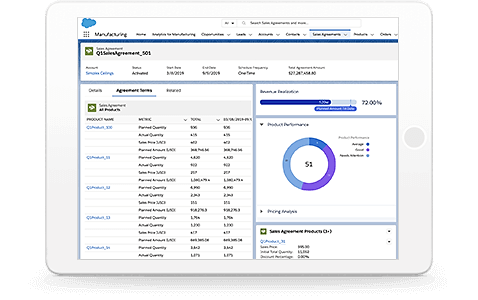In the rapidly evolving landscape of modern manufacturing, staying competitive and efficient is crucial for success. According to a Q&A with Salesforce's Ashish Kothari, the manufacturing industry depends on predictability, as its capital-intensive businesses often have complex operations that struggle to quickly change to meet market demands.1 To increase agility, more manufacturers are turning to digital transformation and leveraging cutting-edge technologies. Integrating product life cycle management (PLM), customer relationship management (CRM), and enterprise resource planning (ERP) systems can help manufacturers streamline processes, enhance visibility and collaboration, and accelerate growth. Salesforce for manufacturing is one CRM technology leading in this space.
A modern approach some manufacturers are adopting is “equipment as a service.” The approach mirrors the concept of “software as a service” commonly employed by technology companies. In equipment-as-a-service models, manufacturers not only provide tangible products to customers but also bundle them with ongoing services—to help drive growth throughout the product life cycle. This can help manufacturers build long-term relationships with customers, providing them with not just a product but also the support and maintenance necessary to help meet performance and customer satisfaction standards. As manufacturers adapt to evolving market demands, equipment-as-a-service models stand out as a powerful strategy to help create more value.
How Salesforce for Manufacturing Can Help
While PLM and ERP are essential for internal operations, CRM can take center stage when it comes to meeting customer needs and exceeding expectations. A CRM system like Salesforce can provide manufacturers with valuable insights into customer behavior, preferences, and feedback, enabling tailored strategies for products and services.
Specifically, Salesforce Manufacturing Cloud can help companies gain a complete picture of new opportunities along with customer agreements, long-term projects, and an accurate demand forecast. Further, integrating CRM with PLM and ERP can help provide an enriched view of customer and operations information that can inform product development teams and diminish department silos. By being able to see and track customer preferences along with product and service performance and revenue data, manufacturers can create products and service models that help drive the most value.

Connecting the Value Chain
When CRM, PLM, and ERP systems are connected, this data-rich ecosystem can help improve business outcomes, including enhanced collaboration, efficiency, and product development. Here are seven key reasons why integrating CRM, PLM, and ERP can be beneficial for manufacturing businesses:
- Deeper Sales Insight: Salesforce can showcase valuable sales and demand insights, helping manufacturers make data-driven decisions and refine their business strategies.
- Unified Forecasting: By uniting cross-departmental data, manufacturers can enhance resource planning, product development, and supply chain strategy.
- Service Team Effectiveness: With Salesforce Manufacturing Cloud, companies can monitor the effectiveness of their service teams and streamline end-to-end processes for customer support and product issues across departments.
- Engagement Tracking: Salesforce supports detailed tracking of customer engagement, helping manufacturers tailor their interactions for personalized customer experiences.
- Gain Insights Over Time: With Salesforce’s analytics and reporting tools, manufacturers can gain valuable insights over time to help identify trends and areas for improvement.
- Improved Channel Marketing: Salesforce facilitates effective channel marketing strategies, which can expand brand visibility and market reach.
- Simplified Processes: Salesforce can streamline and automate several processes, helping reduce manual efforts and improve overall efficiency.
Embracing the Future of Manufacturing With Salesforce
In conclusion, Salesforce has emerged as a transformative technology in the manufacturing industry, offering a robust platform that can connect CRM, PLM, and ERP data. Harnessing the power of Salesforce for manufacturing can help companies streamline processes, diminish data silos, enhance collaboration, and drive value. In the dynamic world of modern manufacturing, Salesforce can help accelerate digital transformation and boost agility to keep ahead of evolving market shifts.
How Forvis Mazars Can Help
If you’d like assistance with helping your Salesforce, CRM, and ERP systems run smoothly and efficiently, please use the Contact Us form below to get in touch. The Business Technology Solutions team at Forvis Mazars is a Salesforce partner with certified experience.
- 1“Q&A: Salesforce’s Ashish Kothari on Manufacturing Cloud and the Industry Impact it Will Have,” salesforce.com, September 16, 2019
